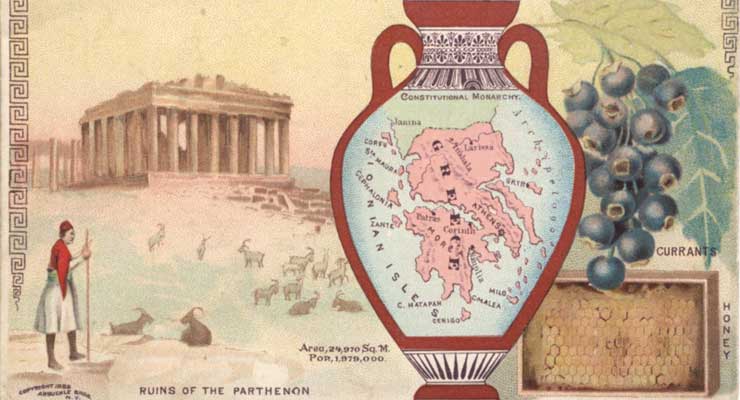
Democracy was first built on a lot of loose rock.
Can democracy now be rebuilt on that very same ground?
Recently, I spent a long afternoon on a dusty and rocky Athens hill called the Pnyx for the first meeting of a novel assembly inspired by the past.
It was the most audacious and beautiful democratic event I’ve ever witnessed.
The Pnyx rises just west of the Acropolis. There, the ancient Athenian Ecclesia, consisting of local citizens mostly chosen by lot, gathered more than 100 generations ago to make all important government decisions. No assembly had met there since 322 B.C.E—until that warm early fall night.
This new People’s Assembly was open to anyone, unlike its ancient Athenian predecessor, which excluded women, slaves, and foreigners. Indeed, the 92 attendees I counted were roughly split between men and women, and included people from more than 15 European countries, plus a few visitors from other continents.
But the transformational potential of this People’s Assembly goes far beyond inclusion. If its members can establish their assembly in the governance of Europe, it might change everything we think we know about democracy.
“Citizens of Athens, citizens of the world,” declared Kalypso Nicolaidis, a Franco-Greek scholar who helps lead the assembly and is chair in global affairs at the European University’s School of Transnational Governance, “we would like to invite you to change yourselves.”
Around the world, democracy is seen as a system in which the public, through elections, chooses its representatives. But the People’s Assembly wouldn’t consist of elected politicians. Instead, it would be composed of everyday people, chosen by lottery processes that ensure that the body is a demographic mirror of the people it represents.
These wouldn’t be just the people of one city, or one province, or even one nation. The People’s Assembly would be a transnational body, with members selected by lottery to represent all of Europe. There’s no body like that on Earth.
But what truly sets apart the idea—and what would make it revolutionary—is its permanence.
Assemblies chosen by lotteries have become increasingly common around the world, especially in Europe and Japan. But almost all of these assemblies are temporary bodies. They are convened to answer some big question or reckon with some thorny problem. They meet for weeks or months or even a year or so. Then they issue their plan or recommendations—and dissolve.
The People’s Assembly would never go away. Certainly, its members would change frequently, often after just months, with a new lottery to refill posts. But it would become a permanent feature of the landscape, its own branch of government.
It also would signal that the age of the elected politician is fading. Politicians are already an unpopular group almost everywhere—corrupted, incompetent, ineffective. Democracy by lottery is appealing because it offers a model to allow citizens to check politicians, and perhaps one day to replace them.
A move away from elected politicians, and toward representatives selected by lottery, also would mean a greater diminishment of elections. Ironically, eliminating or reducing the frequency of elections might be a way to save democracy.
In many places, elections no longer reinforce democracy. They are too compromised—by diminishing social trust, by money in politics, by the outsized power of parties and interest groups. Their outcomes often lead to conflict, violence, even war. And elections are routinely used by authoritarians and dictators to gain popular legitimacy.
Which is why a successful, continent-wide People’s Assembly would likely inspire the creation of more such permanent bodies—at the national, provincial and local levels in Europe and elsewhere. In turn, the spread of such assemblies would require changes in political infrastructure, new modes of lobbying, and new kinds of technocratic agencies to support lottery-selected representatives.
How might government and democracy be different in an era of these assemblies? Camille Dobler, a veteran facilitator of assembly processes at the Paris-based Missions Publiques, answers that question in a word: “trans-localism.” By that, she means a fusion of transnational and local governance.
Which makes sense. Assemblies by lot, from those Athenians gathering 2,300 years ago to the new versions today, are fundamentally local tools. Because it’s easiest to assemble with your own neighbors. But in a deeply networked world facing planetary problems of climate and health and war, there is a need for transnational governance.
So, we are likely to see new networks of local and national assemblies that collaborate through transnational bodies, like the People’s Assembly. How such collaborations might best work is one of the most urgent governance questions of the future.
It’s easier to foresee the failure of current democratic structures than the journey to the next forms of democracy. There is so much to figure out—new systems, new demands on everyday people, new modes of collaboration.
So, the people and organizations behind the People’s Assembly have announced that they are embarking on a “Democratic Odyssey” to talk to people across Europe about how they want their assembly, and the future, to work. Next fall, they plan to return to Athens to reconvene the Assembly, and begin its formal work.
“We are ready to get our boots dirty,” Nicolaidis said while standing on that rocky hill.
Leave a Reply